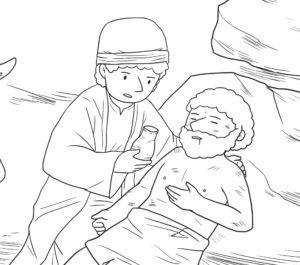Click For Audio Version
What Does Love Thy Neighbor Mean
What does love thy neighbor mean? It is a question that all Christians need to answer. Why? Because loving our neighbor is a command given by God. Jesus also reinforces it in the following scriptures, and several of the Apostles refer to this command also.
Matthew 22:34-40 says After Jesus had silenced the Sadducees, the Pharisees decided to entrap Him if they could. (KJV) account says, “35 One of them, an expert in the law, tested him with this question: 36 “Teacher, which is the greatest commandment in the Law?”
37 Jesus replied: “Love the Lord your God with all your heart and with all your soul and with all your mind.’(quoted from Deuteronomy 6:5) 38 This is the first and greatest commandment. 39 And the second is like it: ‘Love your neighbor as yourself.’ 40 All the Law and the Prophets hang on these two commandments.”
The two greatest commandments!
As you can see from this Scripture, the first command is to “Love the Lord your God with all your heart and with all your soul and with all your mind.” The second commandment is only valuable to you if you follow the first.
God should be your first thought when you wake in the morning and your last thought when you go to bed. Making God first takes practice. It will not come without you making an effort every morning and every evening. But the rewards are truly remarkable.
However, what Jesus refers to as the second greatest commandment is what we will look at today. In my mind, it is the harder of the two.
To live a life for God, both are important. Why would Jesus say that the second most important is to love thy neighbor and what does love thy neighbor mean?
We have all kinds of ideas about our neighbors. Most people think of them as those who live close by, maybe just those with whom we attend church. Everyone has a little different idea.
Who is your neighbor
The question we want to answer is still, “What does love thy neighbor mean?” Jesus answers that question for us in the parable of the good Samaritan in Luke 10:30-36.
Jesus tells the parable of a certain man who was attacked, robbed, and left wounded beside the road. Jesus uses a priest, a Levite, and a Samaritan’s reaction to the wounded man as an example. The priest and the Levite represent the religious leaders of today, and the Samaritan represents the lost.
If you have read the parable, you know that the priest and Levite both pass by on the other side of the road. They changed sides because they did not want to contaminate themselves on their journeys.
The “good Samaritan,” on the other hand, not only stops and treats the wounded man but takes him to an inn and feeds him. This is truly being a good neighbor. He even tells the innkeeper to care for him until he is ready to travel.
Showing love and concern for someone who is in need is what loving your neighbor is all about. It does not take a lot to understand who was the good neighbor in this parable.
Love your neighbor
We tend to focus on commands such as those found in the Old Testament and Romans 13:9, “You shall not commit adultery,” “You shall not murder,” “You shall not steal,” and “You shall not covet.” But we often forget what Paul says in the last portion of this verse, “and whatever other command there may be, are summed up in this one command: “Love your neighbor as yourself.”
What you do is more important than what you don’t do!
We grow up with parents telling us what not to do to be good, which is essential. Then, when we have children, we apply many of the same rules to our children and life in general.
Of course, we teach them to love and respect others along the way. What we fail to do is show them how to love people that are hard to love. For example, our neighbor next door may be a horrible person. Our children may hear us say awful things about them.
We need to teach them the answer to the question, “what does love thy neighbor mean?”. Then, showing them our actions of love will be more effective. We can let them see us being kind and helping someone who would be rejected by many.
Conclusion:
Paul the Apostle says, for the entire law is fulfilled in keeping this one command: “love your neighbor as yourself.” Real love does not harm others. On the contrary, it is always willing to help and encourage.
